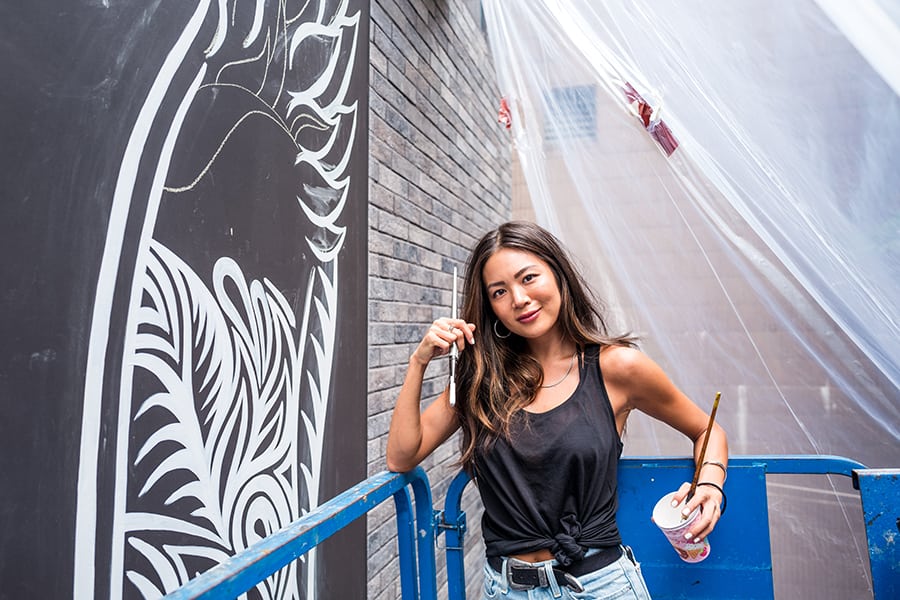Alana Tsui did not think in the least of joining TikTok before the coronavirus pandemic.
The artist and influencer already has a robust following on Instagram. And like many others, the 31-year-old had dismissed TikTok as an app for teenagers.
Then the spread of the virus in New York also forced Tsui to stay at home to curb the pandemic, and she found herself with a lot of free time to try something new.
“I thought: there's lockdown, I have nothing to do… and it seemed fun,” he said. She now sometimes finds herself posting four videos a day on the platform.

Tsui isn't the only one. In recent months, hundreds of millions of people around the world have downloaded the video app as the US, Europe and other states imposed quarantines to curb the spread of the coronavirus.
For many people, the app has become a fun escape from all the grim news about the virus and its economic toll.
Social without commitment
TikTok seized on the problem in the moment, pushing upbeat hashtags like “#HappyAtHome,” which has seen many users convince their parents to make TikTok videos too.
The results obtained by relaxing content promoted directly by the platform are also good. Two Wednesdays ago, for example, one of the streams on TikTok was broadcasting live footage from a Panda reserve reserve.
The strategy paid off. In just two months (January to March) TikTok was downloaded 315 million times, a result that surpassed any other app for a single quarter.
TikTok now has a total of 2 billion downloads, double that of just 15 months ago.
Attractive skills
With the big numbers also come what appear to be signs of a domino effect. TikTok is also starting to "break through" to different categories of users and attracts the "stars" of other social networks. Content creators and influencers with millions of followers on Instagram and YouTube are now also switching to this platform.
It is a progressive discovery: in very fast times like those of the network, those over thirty need to familiarize themselves with the dynamics of TikTok. Adapt to the format, above all.
The record influx of new users across multiple age groups is a big win for ByteDance, the company behind TikTok. The app is the only (so far) social media platform created by a Chinese company to have achieved significant results outside of China.
TikTok: prophet at home
The Beijing-based startup's success within China during the pandemic has been even more striking, and may provide clues to how TikTok hopes to become a major money-maker in the future.
ByteDance's mobile apps grossed $ 157 million from January to March, according to Sensor Tower. Almost 90% of this amount comes from the Chinese domestic market and the “home” version of the app, called Douyin. These are still low figures compared to the Western social giants, yet it was the quarterly record for ByteDance, with a del% increase 423 compared to the same period of the previous year.
Here is La Mancha, influencer
In China, live streaming is very popular. Influencers often make money by receiving virtual tips during live streams.
“There is a habit on Chinese apps of tipping content creators,” he said Wiktoria Marszalek, account manager of Nanjing Marketing Group, a company that helps foreign companies grow their brands and sales in China.
For example, Douyin users purchase donuts or virtual hearts that they can give to content creators or influencers during live streams. This obviously translates into in-app revenue for ByteDance.
Douyin and TikTok's revenue will "skyrocket," he said Randy Nelson, analyst at Sensor Tower. The app's success in monetizing users places it among the best entertainment companies.
Westerners are not so used to the Chinese style of live streaming. Giving virtual money to content creators on social media is not a common practice: Facebook has an in-app currency introduced to allow users to tip content creators, but has never gained ground.
The testing ground does not stop at the "virtual tip". TikTok has also begun experimenting with e-commerce buttons for select advertisers and influencers. The advertising revenue would be split between TikTok and the influencer.
Like many other social media companies, TikTok predicts that the coronavirus will deal a serious blow to advertising revenue in the United States, Europe and other markets in which it operates.
It has started “donating” ad credits to healthcare organizations so they can post updates on the pandemic. It will offer more free advertising space to restaurants and small businesses as they begin to reopen, the spokesperson said.
When companies start to spend again, many bet that TikTok will be the place where they will pour money.
Let's go back for a moment to Tsui, TikTok influencer
At the beginning of the post I told you about her. Before moving to New York, Tsui lived in Hong Kong, where she earned about $1.500 a month working with brands and advertisers to promote their items to her 74.000 Instagram followers.
Breaking up on Instagram in New York proved difficult. But now, “everyone is talking about TikTok, brands are really targeting influencers and running ads on TikTok,” she said.
Tsui therefore joined TikTok in early April. One of his posts managed to land a coveted spot in the app's "suggested" feed, a place where users can watch content that TikTok's algorithm thinks they'll like. Tsui has gone from 17 followers to over 10.000 overnight. He currently has around 27.000 followers.
Tsui is currently trying to figure out the (notoriously mysterious) TikTok influencer algorithm in hopes of being able to develop a following strong enough to lead to consistent earnings.
“I think TikTok is the way to go in the future in terms of advertising and promoting products,” Tsui said.


